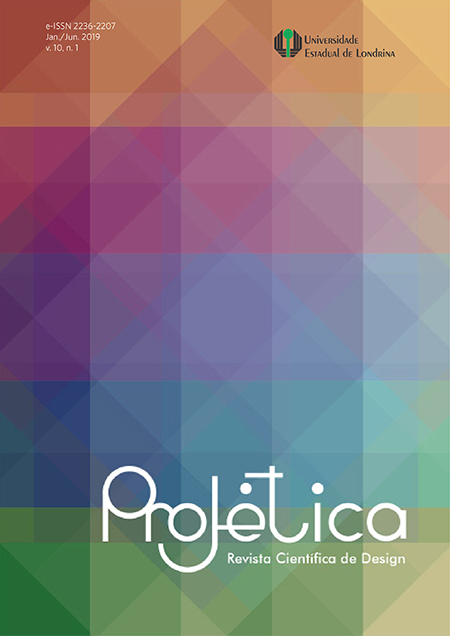Design for services and sound aesthetics in the servicescape: influence on the user aesthetics experience
DOI:
https://doi.org/10.5433/2236-2207.2019v10n1p77Keywords:
Sound aesthetics, Aesthetics experience, Servicescape, Service design, SoundscapeAbstract
The present research investigates the influence of sound aesthetics on the service environment, from the perspective of Service Design. The investigation was guided by the questioning: how does sound aesthetics influence the user aesthetics experience in a given service environment? The main objective was to demonstrate how sound aesthetics influence the user aesthetics experience. In order to achieve the research purposes, a bibliographic review was performed using two techniques: systematic and narrative. In addition to that, a survey was carried out using the RPE-Hearing tool. The research took place in a shopping mall in the city of Curitiba. The target audience was users in the service environment of said mall. Participants were selected randomly, but they had to be at least 14 years old. Results show that the sound landscape of a service environment influences the creation and maintenance of mood states, whether positive or negative. Future work may include a research involving other hedonic service environments in order to deepen the knowledge about the influence of the sound landscape on the user aesthetics experience of services.Downloads
References
ADDIS, Michela; HOLBROOK, Morris B. On the conceptual link between mass customization and experiential consumption: an explosion of subjectivity. Journal of Consumer Behaviour, London, v. 1, n. 1, p. 50-60, 2001. Disponível em: http://onlinelibrary.wiley.com/doi/10.1002/cb.53/pdf. Acesso em: 10 dez. 2016.
AHTOLA, Olli T. Hedonic and utilitarian aspects of consumer behaviour: an atitudinal perspective. Advances in Consumer Research, v. 12, p. 7-10, 1985. Disponível em: http://www.acrwebsite.org/volumes/6348/volumes/v12/NA12. Acesso em: 10 dez. 2016.
ABRASCE - ASSOCIAÇÃO BRASILEIRA DE SHOPPING CENTERS. Disponível em: http://www.abrasce.com.br/. Acesso em: 17 jul. 2017.
BITNER, Mary Jo. Servicescapes: the impact of physical surroundings on customers and employees. Journal of Marketing, Chicago, v. 56, n. 2, p. 57-71, 1992.
CONFORTO, Edivandroi Carlos; AMARAL, Daniel Capaldo; SILVA, Sérgio Luis. Roteiro para revisão bibliográfica sistemática: aplicação no desenvolvimento de produtos e gerenciamento de projetos. In: CONGRESSO BRASILEIRO DE GESTÃO DE DESENVOLVIMENTO DE PRODUTO., 8., 2011, Porto Alegre. Anais [...]. Porto Alegre, 2011. Disponível em: http://www.ufrgs.br/cbgdp2011/ downloads/9149.pdf. Acesso em: 14 dez. 2016.
CONSIGLIERI, Victor. As significações da arquitetura. Lisboa: Estampa, 2000. COSTA, Humberto. Design para serviços e consistência estética: proposição de um protocolo de avaliação estética em serviços. 2017. 462 f. Tese (Doutorado em Design) – Setor de Artes, Comunicação e Design, Universidade Federal do Paraná, Curitiba, 2017.
CRESWELL, John W.; CLARK, Vicki L. Plano. Pesquisa de métodos mistos. 2. ed. Tradução de Magda F. Lopes. Porto Alegre: Penso: 2013. DAMÁSIO, António. E o cérebro criou o homem. São Paulo: Companhia das Letras, 2011.
DAMÁSIO, António. Em busca de Espinosa: prazer e dor na ciência dos sentimentos. São Paulo: Companhia das Letras, 2004.
DAMÁSIO, António. O mistério da consciência. São Paulo: Companhia das Letras, 2006.
DRESCH, Aline; LACERDA, Daniel Pacheco; ANTUNES JUNIOR, José Antonio Vale. Design science research: método de pesquisa para avanço da ciência e tecnologia. Porto Alegre: Bookman, 2015.
FREIRE, Karine de Mello. Design de serviços, comunicação e inovação social. 2011. Tese (Doutorado em Design) - Pontifícia Universidade Católica, Rio de Janeiro, 2011.
GOLEMAN, Daniel. Inteligência emocional. 47. ed. São Paulo: Objetiva, 1995.
GRAY, David E. Pesquisa no mundo real. 2. ed. Porto Alegre: Penso, 2012.
GURNEY, Edmund. The power of sound. London: Smith, Elder, 1880.
HEKKERT, Paul; LEDER, Helmut. Product aesthetics. In: SCHIFFERSTEIN, Hendrik N. J.; HEKKERT, Paul. (ed.). Product experience. San Diego, CA: Elsevier, 2008. p. 259-285.
HIRSCHMAN, Elizabeth C.; HOLBROOK, Morris B. Hedonic consumption: emerging, concepts, methods and propositions. Journal of Marketing, Chicago, n. 46, p. 92-101, 1982.
HOLMLID, Stefan; EVENSON, Shelley. Bringing service design to service sciences, management and engineering. In: HEFLEY, Bill; MURPHY, Wendy. Service science, management and engineering education for the 21st century: part 3. New York: Springer, 2008. p. 341-345.
LAUKKA, Petri. Uses of music and psychological well-being among the elderly. Journal of Happiness Studies, Dordrecht, v. 8, p. 215-241, 2007.
LEDOUX, Joseph. O cérebro emocional. Rio de Janeiro: Objetiva, 2001.
LEVINSON, Jerrold. Music and the negative emotions. In: LEVINSON, Jerrold. Music, art, & metaphysics. Ithaca: Cornell University. 1990. p. 306-335.
STICKDORN, Marc; SCHNEIDER, Jakob. This is service design thinking: basics, tools, cases. Amsterdam: BIS Publishers, 2010.
ZEITHAML, Valarie A.; BITNER, Mary Jo; GREMLER, Dwayne D. Marketing de serviços: a empresa com foco no cliente. Porto Alegre: Bookman, 2011.
Downloads
Published
How to Cite
Issue
Section
License
Projética está licenciada sob a Creative Commons Attribution CC-BY 4.0 International. Os autores detém os direitos autorais e concedem à revista o direito de exclusividade de primeira publicação.
Os autores dos trabalhos aprovados autorizam Projética a, após a publicação, ceder seu conteúdo para reprodução em indexadores de conteúdo, bibliotecas virtuais e similares.
Os autores assumem que os textos submetidos à publicação são de sua criação original, responsabilizando-se inteiramente por seu conteúdo em caso de eventual impugnação por parte de terceiros. As opiniões emitidas pelos autores dos artigos são de sua exclusiva responsabilidade.
A revista se reserva o direito de efetuar, nos originais, alterações de ordem normativa, ortográfica e gramatical, com vistas a manter o padrão culto da língua e a credibilidade do veículo. Respeitará, no entanto, o estilo de escrever dos autores. Alterações, correções ou sugestões de ordem conceitual serão encaminhadas aos autores, quando necessário. Nesses casos, os artigos, depois de adequados, deverão ser submetidos a nova apreciação. As provas finais não serão encaminhadas aos autores.











